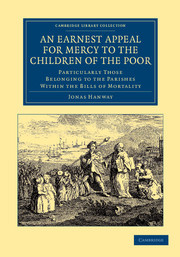Description
An Earnest Appeal for Mercy to the Children of the Poor
Particularly Those Belonging to the Parishes within the Bills of Mortality
Cambridge Library Collection - British & Irish History, 17th & 18th Centuries Series
Author: Hanway Jonas
Published in 1766, this philanthropic tract exposes the failings of the care system in London and calls for its reform.
Language: English
Subject for An Earnest Appeal for Mercy to the Children of the Poor:
Approximative price 31.58 €
In Print (Delivery period: 14 days).
Add to cart
Publication date: 08-2013
Support: Print on demand
Support: Print on demand
Description
/li>Contents
/li>
In eighteenth-century London, abandoned children were one of the social groups most affected by the harsh living conditions. Several charitable initiatives had endeavoured to alleviate the problem, not least the Foundling Hospital, of which Jonas Hanway (c.1712?86) was a governor. His tireless philanthropy and campaigning resulted in the 1762 Registers Bill, which required parishes to keep records of the poor children they looked after. In this tract, first published in 1766, Hanway uses information collected from these registers to demonstrate the appalling mortality rates of orphans in care in London, calling for radical reform. This work was instrumental in the passage of the 1767 act that resulted in a dramatic fall in the number of infant deaths over the following decade. It is a powerful exposé of the failures of the capital's care system, as well as a testament to the influence of philanthropic activism.
Dedication; 1. Observations on the state of the infant parish poor; 2. Heads of the Act for the keeping registers; 3. Remarks on the Act; 4. Observations on the register; 5. Particular investigation of the registers; 6. Remarks on the registers of particular parishes; 7. Further reasons for a parliamentary enquiry; 8. Proposal for all children; 9. Some observations on the welfare of the poor; 10. The advantages of placing out children; 11. The benefit of giving apprentice fees; 12. The absurdity and danger of placing out children; 13. The necessity of a religious education; 14. The importance of a true sense of religion; 15. Further reasons for giving a pecuniary gratuity; 16. A list of the parishes whose numbers of children are worthy of notice.
© 2024 LAVOISIER S.A.S.




